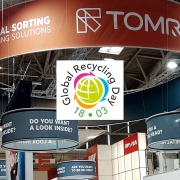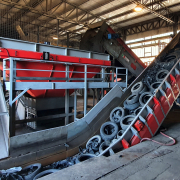BIR Global eForum – Tyres and Rubber: Renewed Threat to Crumb Rubber Use as Infill in Sports Pitches
With impeccable timing, the BIR Tyres & Rubber Committee hosted its first-ever eForum on the day after a high-level committee called for use of crumb rubber as infill for sports pitches to be prohibited.
On June 10, the European Chemicals Agency’s Committee for Risk Assessment (RAC) recommended a complete ban on the use of microplastics as infill material on the grounds that information on the effectiveness of risk management measures was incomplete and that a ban would be more effective in preventing environmental releases in the long term. The ban should apply after a transition period of six years, it has been proposed.
At the eForum chaired by Max Craipeau of China-based Greencore Resources Ltd on June 11, guest speaker Fazilet Cinaralp said that such a move would threaten all polymeric infill materials in this application. The Secretary General of the European Tyre and Rubber Manufacturers’ Association (ETRMA) went on to argue that the repercussions would be “catastrophic” if this “important” market for crumb rubber were to be lost. Mr Craipeau described the prospect as “scary”.
Many studies had confirmed that crumb rubber infill presented no health risks, according to Ms Cinaralp. “We call for fact- and science-based regulations,” she said. “We have a strong fight ahead of us.” Even though the recommendation was to delay the ban for six years, this would still discourage investment, she pointed out.
The RAC proposal contrasted with more positive news from Italy where ministerial approval has been granted to a decree which establishes firm criteria whereby tyre-derived rubber ceases to be defined as waste and instead is categorized as a material. Giovanni Corbetta, General Manager of Ecopneus, explained that the dispensation required: qualifying tyres to be washed to eliminate any surface contamination; the output to be sampled in a certified laboratory; and training for all employees working in the plant to help avoid any mistakes in fulfilling the criteria. Furthermore, uses of the final “material” were limited to those on an approved list.
Having offered her congratulations for this success, Ms Cinaralp noted that several other European countries – including Portugal, the Netherlands and Denmark – had also agreed end-of-waste criteria. With EU waste legislation currently under review, she added, “we have an opportunity to make the case for end-of-waste criteria for end-of-life tyres (ELTs) where we could really harmonize them across Europe”.
Earlier, Ms Cinaralp had provided an overview of the impact of COVID-19 on Europe’s tyre recycling sector. Collection rates had declined by “up to 80%” in some instances while customers “had naturally tended to go for cheaper virgin raw materials instead of the circular recycled material” given the combination of “extremely low” virgin raw material prices and a drop in company turnovers.
Gabriel Leal, General Manager of Signus in Spain, confirmed that domestic tyre collections in April and May had been, respectively, 48.9% and 42.1% of their levels in the corresponding months of 2019. Volumes of ELT-derived granules and powders put on the market had been down almost 87% year on year in April and down 66.4% in May.
Des Collins of Continental AG and Flavio Piovesan of Bridgestone both highlighted the early success with a producer responsibility scheme in Ireland, with the former explaining that it had brought greater transparency to a market which was now known to comprise around 4 million tyres per year.
The eForum also focused on pyrolysis which, according to José Maria Bermejo of the ETRMA, accounted for less than 1% of ELT treatment within Europe. Barriers to its wider uptake included a less favourable competitive position in relation to virgin materials and environmental issues. Efficient technologies producing high-quality outputs were not widespread, he said.
In relation to carbon black, Mr Craipeau said: “I think we are still very far from complete substitution from virgin to recycled material.” However, he urged further development work around the world in order to advance the Circular Economy.
Mr Craipeau also reiterated his plea to the European Parliament to move towards a mandatory recycled content in new rubber compounds provided that this entailed no great impact on their properties.
Source: BIR – Bureau of International Recycling (Brussels, 12 June, 2020)







